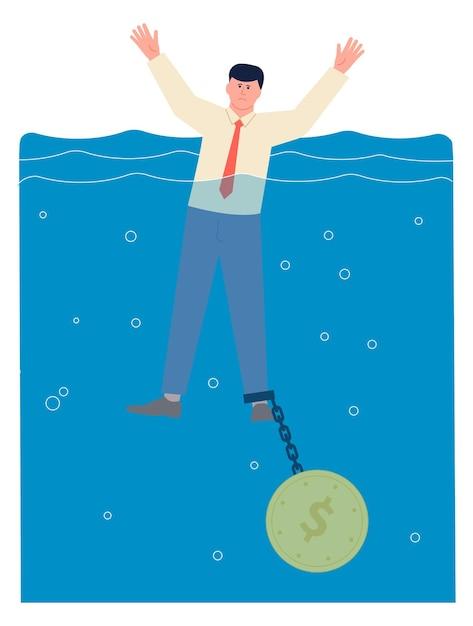Are you feeling overwhelmed by debt? You’re not alone. According to recent studies, millions of people are drowning in debt and struggling to make ends meet. It can be a frustrating and scary situation to be in, but there are resources and strategies available to help you get back on your feet.
If you’re worried about your debt, you may be wondering if there’s anything you can do to turn things around. Fortunately, there are steps you can take to reduce or eliminate your debt and start living a more financially stable life. From budgeting and consolidating your debt to seeking professional help, there are various options available to help you find relief.
But it’s not just a matter of getting out of debt. Being in debt can also impact your mental health, leading to stress, anxiety, and even depression. And if you have a loved one or friend who is struggling with debt, it can be challenging to know how to support them without overstepping boundaries.
In this blog post, we’ll explore some effective strategies for managing and overcoming debt while also prioritizing your mental well-being. We’ll also discuss ways that you can help a friend or family member who is also struggling with debt. So, if you’re ready to take control of your financial future, let’s dive in!
What to Do If You’re Drowning in Debt
Debt is one of the biggest sources of stress and anxiety in the world, and it’s easy to feel like there’s no way out. But the truth is, there are steps you can take to get your finances back on track and start making progress towards a debt-free future.
Take Stock of Your Situation
The first step in getting out of debt is to take a hard look at your finances and figure out exactly where you stand. This means putting together a list of all your debts, including credit cards, loans, and any other money you owe. Write down the interest rates you’re paying on each debt, as well as the minimum payments you’re required to make each month.
Make a Plan
Once you know how much you owe and how much interest you’re paying, it’s time to make a plan. The first priority should be to stop adding to your debt. Cut up your credit cards and stop using them altogether if possible. Then, focus on paying off the debts with the highest interest rates first, as these are the ones that are doing the most damage to your finances.
Consider Consolidation
If you’re struggling to keep track of multiple debts with different interest rates and payment schedules, consider consolidating your debt into a single loan. This can simplify your finances and make it easier to keep track of your progress towards becoming debt-free.
Seek Help if Necessary
If you’re really struggling to make ends meet, don’t be ashamed to seek help. There are a number of resources available to help people who are drowning in debt, including credit counsellors, debt consolidation companies, and non-profit organizations.
Getting out of debt is never easy, but it’s important to remember that you’re not alone. With the right plan and a little bit of discipline, you can start making progress towards becoming debt-free and regaining control of your finances. Remember, the key is to take action and stay committed to your goals. Good luck!
What to Do If You Are Drowning in Debt on Reddit
If you’re struggling with debt, you’re certainly not alone. In fact, many people have found solace in sharing their debt stories on Reddit. Whether you’re looking for ways to pay off debt faster or simply seeking emotional support, Reddit can be a fantastic resource. Here’s what you need to know about seeking help for debt on Reddit.
Join Relevant Subreddits
Reddit has a subreddit for just about everything, and debt is no exception. By joining subreddits like r/debt, r/personalfinance, and r/DaveRamsey, you’ll gain access to a community of people who are experiencing similar situations. This can give you a sense of social comfort and validation, as well as a way to exchange ideas and advice.
Be Honest About Your Situation
While sharing personal information online can be intimidating, it’s important to be truthful about your debt. Many Redditors are willing to offer support, advice, and even practical solutions. However, they need to understand your situation to be most helpful. So, consider including important details such as your debt amount, interest rates, and type of debt in your post.
Take Action Based on Advice
Reddit is an excellent place to get insight and ideas, but it’s important to follow up and implement the advice you receive. You might consider making a plan to pay off your debt, consolidating your debt, or seeking professional help. Whatever action you choose to take, make sure it’s in line with your financial goals.
Don’t Worry About Judgment
One of the biggest benefits of using Reddit to discuss debt is that it’s anonymous. You don’t have to worry about judgment from others who might know you in real life. In fact, many users say they are more comfortable sharing their financial struggles online than they are with friends and family members.
In conclusion, discussing debt on Reddit can be a helpful way to gain support, ideas, and advice. By joining relevant subreddits, being honest about your situation, taking action based on advice, and not worrying about judgment, you’ll be well on your way to conquering your debt. Keep in mind that while Reddit can be a fantastic resource, it’s still important to consider seeking professional advice and support as well.
I Am in Debt and Have No Money
If you are in debt and have no money, you may feel as though you are stuck in a never-ending financial nightmare. It can be difficult to even think about how to start tackling your debt when you are struggling just to cover your basic expenses each month. However, there are steps you can take to begin making progress:
Evaluate Your Income and Expenses
The first step in dealing with debt is understanding how much money is coming in and going out each month. Make a list of all your sources of income, including your job, any side hustles, or freelance work. Then, list all of your expenses, including rent or mortgage payments, utilities, food, transportation, and any other regular bills.
Once you have a clear picture of your income and expenses, you can start to identify areas where you may be overspending or where you may be able to cut back. Consider ways to reduce your expenses, such as canceling unnecessary subscriptions or downsizing to a smaller apartment.
Prioritize Your Debts
If you have multiple debts, it can be overwhelming to figure out which ones to focus on first. One approach is to prioritize debts with the highest interest rates, as those will cost you the most money in the long term. However, you should also consider any debts that are in arrears, as falling behind on payments can lead to additional fees and damage your credit score.
Consider Debt Consolidation
If you are struggling to make payments on multiple debts with varying interest rates, consolidating your debts into one loan may help simplify your payments and potentially lower your interest rate. However, it’s important to carefully consider the terms and fees associated with debt consolidation before committing to a new loan.
Seek Help From a Professional
If you are feeling overwhelmed or unsure of how to tackle your debts, consider seeking help from a financial advisor or credit counselor. These professionals can provide guidance on developing a budget, negotiating with creditors, and developing a repayment plan.
Remember, dealing with debt takes time and effort, but it’s important to take action and start making progress towards a more stable financial future. By evaluating your income and expenses, prioritizing your debts, and seeking help when necessary, you can take control of your finances and start working towards a debt-free life.
How to Survive a Debt Trap
Are you sinking in debt and struggling to stay afloat financially? One of the major worries for most people is the inability to cope with debts. This can lead to stress, anxiety, and in severe cases, depression. However, there’s a way out of this financial quagmire. Here are a few strategies to help you survive a debt trap:
1. Create a Budget
Creating a budget can help you take control of your finances. Start by noting down all your sources of income and expenses. Categorize your budget into two parts: fixed and variable expenses. Fixed expenses are those that recur monthly, such as rent, car payments, or insurance premiums. Variable expenses, on the other hand, fluctuate, such as groceries or entertainment. Analyze your budget and find areas where you can cut back and save. This would enable you to have extra money that can be diverted towards debt payment.
2. Focus on High-Interest Debts
When you have multiple debts, you need to choose which one to tackle first. It can be daunting, but the best approach is to prioritize the debt with the highest interest rate. This is the debt that’s costing you the most money in interest charges. Redirecting your extra cash towards paying off the high-interest debt can help you save money in the long run, and eventually, help you become debt-free.
3. Seek Professional Help
If you’re overwhelmed by the debts, it’s important to seek professional help. Consider consulting a certified financial planner, a credit counselor, or a debt management company. These professionals can help you with debt repayment strategies, budgeting, and provide financial education. They can also help you negotiate with your creditors for better repayment terms.
4. Avoid Accumulating New Debts
It’s crucial to curb your spending and avoid accumulating new debts. Consider reducing your credit card usage or cutting back on non-essential expenses. This would help prevent your debts from spiraling out of control and putting you in a worse financial position.
In conclusion, getting out of a debt trap requires commitment, perseverance, and discipline. However, with these strategies, you can take charge of your finances and start your journey to becoming debt-free. Start with small steps, and with time, you’ll reap the benefits of a debt-free life.
Drowning in Debt and Depression
Having a lot of debt can be a stressful experience, especially when it starts to affect your mental health. If you’re drowning in debt and experiencing depression, know that you’re not alone. Here are some tips to help you manage your debt and your mental health:
Reach Out for Help
The first step to managing debt and depression is to reach out for help. Talk to a trusted friend or family member, or seek professional help from a therapist. They can provide support, advice, and help you find resources to manage your debt.
Take Care of Yourself
Self-care is essential when dealing with debt and depression. Get enough sleep, exercise regularly, and eat healthy, nutritious meals. Avoid drugs or alcohol as a way to cope with your stress. Instead, consider meditation, mindfulness, or other relaxation techniques.
Create a Budget
To manage your debt, you need to know how much money you have coming in and going out. Create a budget that lists all your expenses, including debt payments. Cut back on unnecessary expenses, such as eating out or buying new clothes. Use any extra money to pay down your debt.
Communicate with Creditors
If you’re struggling to make debt payments, don’t ignore the problem. Communicate with your creditors and let them know your situation. They may be willing to work with you to create a new payment plan or lower your interest rate.
Consider Debt Consolidation or Bankruptcy
If you have a lot of debt, consider debt consolidation or bankruptcy. Debt consolidation combines multiple debts into one payment, while bankruptcy can eliminate some or all of your debts. However, both options have pros and cons, so carefully weigh your options before choosing.
Seek Professional Help
If you’re struggling to manage your debt and depression, consider seeking professional help from a financial advisor or credit counselor. They can provide advice on managing your debt and creating a plan to pay it off.
In conclusion, dealing with debt and depression can be overwhelming, but with the right support and resources, you can overcome these challenges. Remember to take care of yourself, communicate with your creditors, and seek professional help when needed.
How to Help a Friend Who is Drowning in Debt
If you have a friend who is struggling with debt and feeling overwhelmed, there are many ways to help them. Here are some helpful tips to guide you:
1. Listen to Their Concerns
The first step to helping a friend who is drowning in debt is to listen to their concerns. Don’t judge or criticize them for their situation, but instead, provide a safe space for them to express their feelings. Let them know that they are not alone and that you are there to support them.
2. Offer Practical Assistance
Offer practical assistance to your friend by helping them create a budget or speaking to creditors on their behalf. If you have experience with managing finances, offer to teach them some basic financial skills. Help them find ways to reduce their expenses and increase their income.
3. Help Them Find Professional Help
Sometimes, a friend may need more help than you can provide. Encourage them to speak with a financial advisor or a debt counselor. These professionals can help them come up with a plan that works for their situation and provide them with tools to manage their debt.
4. Be Patient and Understanding
Remember that helping a friend who is drowning in debt is a process, and it takes time. It may take a while for them to get back on their feet, but continue to support and encourage them without judgment. Celebrate small successes along the way and remind them that they are making progress.
5. Make Sure They Take Care of Themselves
It’s essential to encourage your friend to prioritize self-care while they tackle their debt. Encourage them to engage in activities that bring them joy and reduce stress. Help them develop healthy coping mechanisms and remind them that their worth is not tied to their financial situation.
In conclusion, helping a friend who is drowning in debt can be challenging, but it’s a worthwhile endeavor. By providing practical assistance, finding professional help, and encouraging self-care, you can help your friend find their way out of debt and towards financial stability.
Getting Out of Drowning in Debt
If you’re feeling overwhelmed with debt, you’re not alone. But there are ways to stop the drowning and start to swim back up to the surface. Here are some practical tips on how to get out of drowning in debt.
Build a Realistic Budget
The first step in managing your debt is to track and control your spending. Start by creating a monthly budget that includes all your income and expenses. Be honest about your spending habits and include every expense, from rent to coffee. By creating a budget and sticking to it, you can see where your money is going and where you need to make adjustments.
Prioritize Your Debt
Once you’ve created a budget, prioritize your debts and focus on paying off the ones with the highest interest rates and balances. By paying off these debts first, you’ll save money on interest and reduce your overall debt load.
Negotiate with Creditors
If you’re struggling to meet your debt payments, don’t hesitate to contact your creditors and try to negotiate a lower interest rate or payment plan. Many credit card companies and lenders are willing to work with you and find a solution that works for both parties.
Consider Debt Consolidation
Debt consolidation can be a useful tool for managing multiple debts. By consolidating your debts into one loan, you can simplify your monthly payments and potentially lower your interest rate. However, it’s important to weigh the pros and cons of debt consolidation before making a decision.
Seek Help from a Professional
If you’re still struggling to manage your debt, consider seeking help from a professional credit counselor. A credit counselor can help you create a budget, negotiate with creditors, and provide financial education and support. It’s important to research and choose a reputable credit counseling agency to ensure you’re getting the best help possible.
In conclusion, drowning in debt is tough, but it’s not the end of the world. By following these practical tips, you can take control of your finances, reduce your debt, and start your journey to financial freedom. Remember, it’s never too late to make a change and start living within your means.
What to do if you are heavily in debt
Living with a significant amount of debt can be overwhelming and stressful. It can be challenging to know where to start, but the good news is that there are steps you can take to get back on track. Here are some things you can do if you are heavily in debt:
Create a budget
The first thing you need to do is create a budget. A budget will help you track your spending and identify areas where you can cut back. Start by listing all your expenses, including your monthly bills, food, and entertainment. Then, look for ways to reduce your spending. Maybe you can cut back on your dining out expenses, or find a cheaper gym membership.
Negotiate with your creditors
If you are struggling to make your monthly payments, it may be time to negotiate with your creditors. Call them up and explain your situation. You may be able to negotiate a lower interest rate or a payment plan that works for you.
Seek professional help
If you are heavily in debt and struggling to make ends meet, it may be time to seek professional help. Consider reaching out to a credit counseling agency or a financial advisor. They can help you create a plan to get out of debt and provide you with valuable resources and support.
Prioritize your payments
When you are heavily in debt, it’s essential to prioritize your payments. Start by making your minimum payments on all your debts, and then focus on paying off the debts with the highest interest rates. This will help you save money in the long run and get out of debt faster.
Explore debt consolidation
Debt consolidation is another option to consider if you are heavily in debt. It involves combining all your debts into one payment, which can help make your debt more manageable. However, be sure to do your research and find a reputable debt consolidation company before signing up.
In conclusion, being heavily in debt can be stressful and overwhelming, but there are steps you can take to get back on track. By creating a budget, negotiating with your creditors, seeking professional help, prioritizing your payments, and exploring debt consolidation, you can get out of debt and achieve financial freedom.
What Happens If You Can’t Afford Your Debt
If you’re struggling to make your debt payments every month, you’re not alone. It’s easy to get into debt, but getting out of it can be a challenge, especially if you’re not sure what steps to take.
Communicate with Your Lenders
The worst thing you can do if you’re struggling to make your payments is to ignore your lenders. Most lenders are willing to work with you if you are honest about your situation. Contact your lenders and explain your financial situation. They may be able to offer you a payment plan or other options that can help you get back on track.
Consider Debt Consolidation
Debt consolidation can be a great option for people with multiple debts. This involves taking out a single loan to pay off all of your other debts. This can make it easier to manage your payments and reduce the interest you’re paying.
Cut Back on Expenses
If you’re struggling to make your payments, it’s important to look for ways to cut back on your expenses. Look for ways to reduce your spending on things like food, clothing, and entertainment. This can free up some of your money to put towards your debt.
Get Help
If you’re struggling to make your payments, there’s no shame in asking for help. There are many resources available to help you get out of debt, including credit counseling services, debt consolidation companies, and more.
If you’re drowning in debt, it’s important to take action as soon as possible. Communicate with your lenders, consider debt consolidation, cut back on expenses, and get help if you need it. Remember, there’s no shame in asking for help. With the right attitude and a willingness to take action, you can get out of debt and start living the life you want.
Living a Debt-Free Life: The Benefits
Being debt-free is a great feeling that comes with various benefits. Here are a few of them:
1. Stress-free Life
Living in debt can be extremely stressful. When you owe money to lenders or credit card companies, you can’t enjoy your hard-earned money. You may even begin to feel hopeless and anxious about your financial future. On the other hand, living debt-free can reduce your stress levels, improve your mental health, and provide peace of mind.
2. Saving Money
If you’re in debt, it’s likely you’re paying interest on the amount you owe. The longer it takes to pay off the debt, the more interest accrues. By paying off your debt and staying debt-free, you can save thousands of dollars in interest fees over time.
3. More Control Over Your Life
Debt can limit your choices and restrict your freedom. For instance, it can limit your ability to travel, purchase a new car, or even buy a house. On the other hand, living debt-free provides you more control over your life. You can make choices based on what you want and need, not on what you can or can’t afford.
4. Improved Credit Score
Debt can have a negative impact on your credit score, making it difficult to qualify for loans or credit cards later on. By paying off your debt and maintaining a debt-free lifestyle, you can improve your credit score, which can, in turn, help you qualify for better rates on loans, credit cards, and mortgages.
5. Better Financial Future
Being debt-free means you’re in control of your finances. You can set goals, plan for your future, and work towards achieving financial freedom. You’re not weighed down by ongoing debt, which can impact your goals and ambitions. By living debt-free, you have the power to create the financial future you want.
Living a debt-free life is a decision that comes with many benefits. By following practical tips and strategies, you can pay off your debt, stay debt-free, and live your best life.



